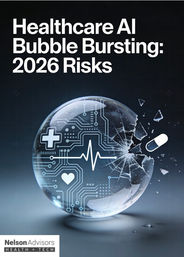Google Med-Gemini-Polygenic: predicting health outcomes based on a patient's genetic data
- Lloyd Price
- Jul 12, 2024
- 5 min read
Updated: Jul 14, 2024

Exec Summary
Google Med-Gemini is a family of advanced AI models specifically designed for the medical field. It's essentially a powerful tool with various functionalities to assist medical professionals, researchers, and potentially even patients in the future.
Here's a breakdown of its key features:
Multimodal capabilities: Unlike many AI models, Med-Gemini can process different kinds of information, including text, images (like X-rays and CT scans), and even genomics data. This allows for a more comprehensive understanding of a patient's condition.
Advanced medical tasks: Med-Gemini can perform various tasks that can aid medical professionals. For instance, it can analyse medical scans and generate reports, even surpassing the accuracy of radiologists in some cases. Additionally, it can predict health outcomes based on a patient's genetic data.
Still under development: It's important to note that Med-Gemini is still under research, and while the results are promising, further testing is needed before widespread use .
Overall, Google Med-Gemini represents a significant advancement in medical AI with the potential to revolutionise healthcare by assisting with diagnosis, treatment planning, and potentially even personalised medicine.
Google Med-Gemini-Polygenic
Google Med-Gemini-Polygenic is like a sophisticated detective looking for patterns in genetic data to predict the possibility of future health problems. It's a valuable tool for doctors, but it doesn't replace their expertise and judgment.
Google's Med-Gemini utilises a specific model called Med-Gemini-Polygenic to predict health risks based on a patient's genetic information]. Here's a simplified explanation of its possible approach:
Large dataset training: Med-Gemini-Polygenic is likely trained on a massive dataset containing anonymised genetic data alongside individuals' health outcomes.This data helps the model identify patterns between specific genetic variations and the likelihood of developing certain diseases.
Focus beyond single genes: Unlike traditional methods that analyze individual genes, Med-Gemini-Polygenic might consider the interplay of multiple genes. This is because many diseases result from a combination of genetic variations, not just a single mutation.
Statistical prediction: Based on the identified patterns, the model can assign a risk score for various health conditions. This score indicates the likelihood of an individual developing a particular disease based on their genetic makeup, but it's important to remember it's not a definitive diagnosis.
Google Med-Gemini is still under development. While initial research shows promise, there are limitations:
Accuracy refinements: The model's accuracy for predicting health outcomes is constantly being improved.
External factors not considered: Med-Gemini-Polygenic likely focuses on genetic predisposition, but environmental and lifestyle factors also play a role in disease development.
Overall, Med-Gemini offers a glimpse into the future of personalised medicine. By analysing genetic data, it has the potential to identify individuals at higher risk for certain diseases, allowing for earlier intervention and preventative measures. However, it's important to remember it's a tool to be used alongside medical expertise, not a replacement for diagnosis or treatment from a qualified healthcare professional.
Nelson Advisors work with Founders, Owners and Investors to assess whether they should 'Build, Buy, Partner or Sell' in order to maximise shareholder value.
HealthTech M&A - Buy Side, Sell Side, Growth & Strategy services for companies in Europe, Middle East and Africa. Visit www.nelsonadvisors.co.uk
HealthTech M&A Newsletter from Nelson Advisors - HealthTech, Health IT, Digital Health Insights and Analysis. Subscribe Today! https://lnkd.in/e5hTp_xb
HealthTech Corporate Development - Buy Side, Sell Side, Growth & Strategy services for Founders, Owners and Investors. Email lloyd@nelsonadvisors.co.uk
Healthcare Technology Thought Leadership from Nelson Advisors – Market Insights, Analysis & Predictions. Visit https://www.healthcare.digital/

Google Med-Gemini-Polygenic
Google Med-Gemini-Polygenic is a specific type of AI model within the Med-Gemini family designed for a particular purpose: predicting health risks based on a patient's genetic data.
Here's a deeper dive into its workings:
Function:
Unlike traditional methods that analyze individual genes, Med-Gemini-Polygenic focuses on a more nuanced approach. It considers the interplay of multiple genes and their variations to predict disease risk. Many diseases arise from a complex combination of genetic factors, not just a single mutation.
By analyzing this interplay, the model can assign a risk score for various health conditions. This score indicates the likelihood of an individual developing a specific disease based on their genetic makeup. However, it's important to remember it's a statistical prediction, not a definitive diagnosis.
Development:
Med-Gemini-Polygenic is likely trained on a massive dataset of anonymised genetic data paired with individuals' health outcomes. This allows the model to identify patterns between specific genetic variations and the likelihood of developing certain diseases.
It's important to note that Med-Gemini-Polygenic is still under development. Researchers are constantly working on improving its accuracy for health risk prediction.
Limitations:
Accuracy: While promising, Med-Gemini-Polygenic's accuracy for predicting health outcomes is still being refined.
Focus: The model primarily focuses on genetic predisposition. However, environmental and lifestyle factors also play a significant role in disease development. These external factors are not currently considered by Med-Gemini-Polygenic.
Overall Significance:
Med-Gemini-Polygenic represents a significant step towards personalized medicine. By analyzing genetic data, it has the potential to identify individuals at higher risk for certain diseases. This could allow for earlier intervention and preventative measures.
However, it's crucial to remember that Med-Gemini-Polygenic is a tool to be used by medical professionals, not a replacement for diagnosis or treatment.
In simpler terms, Med-Gemini-Polygenic is like a sophisticated detective looking for patterns in genetic data to predict the possibility of future health problems. It's a valuable tool for doctors, but it doesn't replace their expertise and judgment.

Competitive Landscape
Google Med-Gemini-Polygenic is at the forefront of AI-based health risk prediction, but it's not the only player in the field. Here's a look at some potential competitors:
Freenome: This company offers a polygenic risk score service for consumers based on DNA analysis. While not directly aimed at medical professionals like Med-Gemini-Polygenic, it focuses on personal health risk assessment and preventative measures.
Paige: This company utilises AI for cancer diagnostics, including analysing genetic data to identify patients at high risk or those who might benefit from specific treatments.
Fabric Genomics: This company offers a platform for analyzing genetic data and identifying potential health risks. It utilises machine learning algorithms and may compete with Med-Gemini-Polygenic in specific areas of risk prediction.
Other AI Research Labs: DeepMind (owned by Google) and other research labs like IBM Watson Health are also exploring the use of AI for analyzing genetic data and health risk prediction. These ongoing projects could emerge as competitors to Med-Gemini-Polygenic in the future.
It's important to note that the field of AI-based health risk prediction is constantly evolving. New companies and research initiatives may emerge as competitors in the future.
Here are some key factors that will likely differentiate these competitors:
Data Access and Quality: The accuracy of AI models like Med-Gemini-Polygenic relies heavily on the quality and size of the training data. Companies with access to vast, anonymised genetic datasets might have an edge.
Focus and Specialisation: Some competitors may focus on specific diseases or health conditions, while others might offer a broader range of risk assessments.
Integration with Medical Workflow: A key differentiator could be how seamlessly these AI models integrate with existing healthcare systems and electronic health records.
Overall, the competition in AI-based health risk prediction is likely to heat up in the coming years. This competition will hopefully drive further advancements in the field, leading to more accurate and accessible tools for doctors and patients alike.
Nelson Advisors work with Founders, Owners and Investors to assess whether they should 'Build, Buy, Partner or Sell' in order to maximise shareholder value.
HealthTech M&A - Buy Side, Sell Side, Growth & Strategy services for companies in Europe, Middle East and Africa. Visit www.nelsonadvisors.co.uk
HealthTech M&A Newsletter from Nelson Advisors - HealthTech, Health IT, Digital Health Insights and Analysis. Subscribe Today! https://lnkd.in/e5hTp_xb
HealthTech Corporate Development - Buy Side, Sell Side, Growth & Strategy services for Founders, Owners and Investors. Email lloyd@nelsonadvisors.co.uk
Healthcare Technology Thought Leadership from Nelson Advisors – Market Insights, Analysis & Predictions. Visit https://www.healthcare.digital/




















































Comments